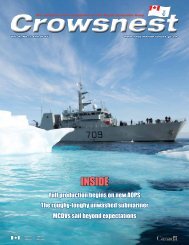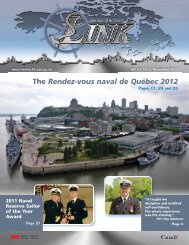You also want an ePaper? Increase the reach of your titles
YUMPU automatically turns print PDFs into web optimized ePapers that Google loves.
<strong>Maritime</strong> security is not <strong>the</strong> only area where multilateral efforts have encountered resistance, as<br />
<strong>the</strong> trend regarding ecological initiatives is not entirely positive. In some cases, widely-supported<br />
initiatives have encountered <strong>of</strong>ten decisive opposition, particularly when it concerns imposing<br />
some form <strong>of</strong> international legal control over portions <strong>of</strong> <strong>the</strong> high seas. At present, approximately<br />
12 percent <strong>of</strong> <strong>the</strong> Earth’s surface is protected by environmental legislation, while only one percent<br />
<strong>of</strong> <strong>the</strong> oceans enjoy a similar level <strong>of</strong> legal coverage. <strong>The</strong> UN Conference on Biological Diversity<br />
set a target in 1997 <strong>of</strong> having 10 percent <strong>of</strong> <strong>the</strong> oceans protected by 2012. By <strong>the</strong> end <strong>of</strong> 2011,<br />
only 1.6 percent had been achieved <strong>and</strong> most <strong>of</strong> <strong>the</strong> existing maritime protection areas are small<br />
<strong>and</strong> near coastlines. 315 It will be far more difficult to obtain agreement on such zones on <strong>the</strong> high<br />
seas. In March 2015, <strong>the</strong> British government established an 830,000 square kilometre marine<br />
reserve around Pitcairn Isl<strong>and</strong> in <strong>the</strong> Pacific. 316 That was, however, <strong>the</strong> decision <strong>of</strong> a single<br />
national authority. With regard to obtaining international accord, <strong>the</strong> results are less convincing.<br />
In 2014, negotiations within <strong>the</strong> Commission for <strong>the</strong> Conservation <strong>of</strong> Antarctic Marine Living<br />
Resources to create <strong>the</strong> world’s largest marine sanctuary failed when China <strong>and</strong> Russia objected<br />
to catch limits on a number <strong>of</strong> fish species, including krill, which are important in local food<br />
chains. 317 As climate change opens <strong>the</strong> polar seas to navigation—safer <strong>and</strong> sustained—it is an<br />
open question if internationally recognized special protections for <strong>the</strong>se sensitive ecological<br />
regions will be negotiable, or if extant (e.g., under UNCLOS), upheld in practice.<br />
315 Roberts, Oceans <strong>of</strong> Life, p. 305.<br />
316 Pew, “National Geographic Applaud Creation <strong>of</strong> Pitcairn Isl<strong>and</strong>s Marine Reserve”, PR Newswire,<br />
18 March 2015 [accessed on 25 March 2015 at http://www.prnewswire.com/news-releases/pew-nationalgeographic-applaud-creation-<strong>of</strong>-pitcairn-isl<strong>and</strong>s-marine-reserve-296729591.html].<br />
317 “Russia, China Reject World’s Largest Marine Sanctuary”, Sea Technology, December 2014, p. 68.<br />
66 DRDC-RDDC-2016-R085




